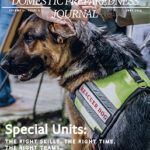Communication is a key to success in disaster preparedness, as became apparent in the lessons learned from the full-scale TOPOFF 4 “Looking Glass” tabletop exercise (TTX) on 17-18 October 2007. The “TOPOFF” (Top Officials) participating in that exercise – fourth in the TOPOFF series – learned three particularly important communications lessons. First, states should involve private-sector companies fairly early in the preparation process, and at the outset of the emergency. Second, private companies should ensure that their own IT (information technology) resources are available for use in emergencies. Third, all states should develop and be ready to use their volunteer databases before an incident occurs, not during or after.
Thousands of federal, state, territorial, and local jurisdictions and agencies throughout the country participated in the numerous exercises and scenarios featured in TOPOFF 4. The New Jersey Business Force provided sponsorship of the Looking Glass TTX (an exercise within TOPOFF 4, which involved 26 jurisdictions, agencies, and businesses. (The full TOPOFF 4 after-action report is available on the Lessons Learned Information Sharing website (www.llis.gov), along with lessons learned and other information about this and other TOPOFF exercises.)
The detonation of a radiological dispersal device (RDD) in Jersey City, New Jersey – directly across the Hudson River from the Manhattan borough of New York City – was the “main event” in the Looking Glass TTX scenario. An RDD is a conventional explosive – also known as a “dirty bomb” – that, upon detonation, releases radioactive material into the surrounding area. Although it does not cause the type of catastrophic damage associated with a nuclear detonation, there are severe rescue, health, and long-term decontamination concerns associated with an RDD.
Looking Glass TTX participants found that the explosion would probably exhaust the state, county, and local government response resources immediately available. Largely due to that reason, private-sector representatives should be involved in the planning for such an incident to be available to assist the government agencies and organizations early on in the incident. Moreover, the private sector provides more and better resources to help in the response and recovery efforts. Regularly and routinely, agencies and organizations, at all levels of government, should exchange intelligence and information with the private sector prior to an incident.
Bridging the Gap, Advance Planning, Volunteer Databases During the October 2007 exercise, participants relied on the private sector’s information systems to help bridge the gaps in responder capabilities by providing rapid resource utilizations, alerts, and warnings as well as strategic collaboration services. The participants also found that, during the first hour after the simulated RDD explosion, numerous information systems ran the risk of crashing because of either a communications surge or the explosion itself. To ensure that valuable private-sector assets are available in the future as and when needed, the TOPOFF-4 after-action report recommends that businesses ensure that preparations and plans are in place beforehand to deal with similar disruptions that might occur.
The exercise participants also found, not surprisingly, that using preregistered and prescreened volunteers during the exercise facilitated faster responses. While planning for an incident, emergency managers therefore should carefully consider making prior arrangements with organizations that already maintain volunteer databases – e.g., the American Red Cross and/or the World Cares Center. Such arrangements could help significantly to speed the deployment and mobilization of volunteers during a time when, literally, seconds count.
To briefly summarize: Whether communicating with private organizations before an incident, communicating with private organizations to ensure well-prepared disaster plans are readily available, or communicating with other groups to access volunteer databases, pre-planning for potential disasters is and will be a vital component of overall domestic preparedness. Learning from the experiences and exercises of similar groups can save not only time and money, but also lives.
_______________
To learn more about the RDD responses and/or the TOPOFF 4 Looking Glass TTX, to share your own experiences with exercises and plans, or to pull information from a wide range of other documents on similar subjects, visit Lessons Learned Information Sharing (LLIS.gov) at www.llis.gov. LLIS.gov is the national online network of lessons learned, best practices, and innovativeeas serving the nation’s emergency-management and homeland-security communities.

Brandy Jones
Brandy Jones is an outreach analyst for Lessons Learned Information Sharing (LLIS.gov), the Department of Homeland Security/Federal Emergency Management Agency’s national online network of lessons learned, best practices, and innovativeeas for the U.S. homeland security and emergency management communities. She holds a Project Management Professional certification from the Project Management Institute, earned top honors from the University of Maryland University College (UMUC) with a BS in Business Administration, and is currently working on a master's degree in Management, with a specialization in Information Systems and Services, from UMUC.
- This author does not have any more posts.






